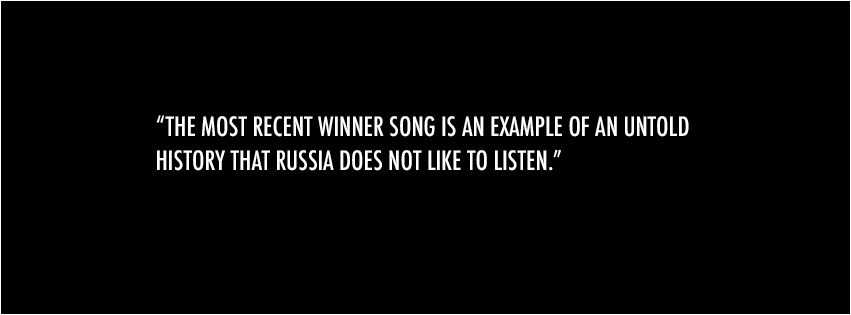Tutkain goes Eurovision is a series of articles about the legendary song contest written by social scientists.
Text: Germán Torres Mora
I watched Eurovision for the first time in 2012. Then I lived in Apartadó, the main city of the Uraba region, in the Colombian Caribbean coast, a green place where the economy is based on the agroindustrial exploitation of bananas. Something powerfully caught my attention: ESC was incredibly extravagant, colorful and opulent. I noticed how the extremely elaborated make-ups and the variety of lights on a predominantly dark scenario contrasted with the equatorial environment where I lived. Black populations, which passed their lives in fragile wood houses and devoted their free time frying plantains and kicking a ball barefoot, came to my mind. Dramatic Eurovision had nothing to do with the festive Salsa and Merengue rhythms, which define the Latin-American folklore, that I have been familiar with during my whole life. Imagine my reaction if I had watched Lordi!
In 2014, I watched Eurovision again. A thick bearded woman won the contest! Conchita Wurst (Thomas Neuwirth), despise previous polemics, was awarded as the winner. Such a situation seemed very exotic for me, raised in a catholic tradition featured by traditional gender constructions and systematic othering of LGBT populations. Moreover, albeit the virtual unknownness of Eurovision in Latin America, Conchita’s victory was widely covered by media in Colombia, since she claimed that was born in Bogotá (we all believed her).
Eurovision and the idea of paneuropeism
Eurovision has vindicated itself as an attempt at constructing paneuropeism. Its targets have been linked to the construction of European imaginaries shared irrespective the nationalities, religions or languages. It seems that Europe aims to overcome its internal divisions in order to validate itself as an important actor in the today’s world.
On the other hand, what if Eurovision is not as innocent as it looks like? I endeavor to decipher the song 1944 performed by Jamala, last winner of the contest:
“When strangers are coming
They come to your house
They kill you all
And say
We’re not guilty
Not guilty”
Definitely something serious occurred in Ukraine a long time ago. Tatars’ deportation is not commonly portrayed in the official history and Eurovision is an opportune platform for narrating it. How problematic it may be, it is an interesting issue, specially when national sensitivities arise.
Eurovision and the Cold War
Eurovision was conceived after the traumatic experience of the Second World War. Before the 90’s, representative artists were sent from capitalist states whereas the communist side of the world organized Intervision, its own contest, with the participation of the so-called second world countries. Two regular participants I pay attention to: Cuba, the first, the only communist state in America and the only participant coming thereof; definitely, Intervision was a communist expression. The second, Finland, traditionally portrayed as a Nordic capitalist economy. But the case of Finland is even more interesting in light of the fact that this country has been a regular participant of Eurovision as well. Taking into account its delicate geographical position this is not an irrational choice. Well played Finland!
Eurovision and the spirit of competition
The contest is not always guided by a spirit of horizontal competition; sometimes it seems to be so ferocious as for arise susceptibilities and provoke the withdrawal of their competitors. For instance, Turkey has not taken part of the contest since 2013. Turkish do not agree with Eurovision’s rules, specially those which allow the Big five countries – Spain, Germany, Italy, UK and France, the main EBU contributors – directly qualifying to the final. It is true that Turkey’s inconformity is reasonable, but it is also true that the contest provokes animosity, rivalry and polarization. Do not take it so seriously Turkey, it is an innocent competition! Or not?
Eurovision, between suspiciousness and mediatization
Eurovision is not enough mischievous to be part of the matters the conspiracy theories are proud of studying. Despite the skepticism recently raised and the political commitment of some songs, the most of these are the perfect material to make tons of euros and rank in the first positions of the radio lists. Somehow, Eurovision aims to consolidate a new Europeness based on sticky songs. Let’s admit it! The fact that former soviet countries take Eurovision so seriously is the triumph of capitalism, some of whose abilities are selling the people what they want and creating new needs on them. Eurovision is doing what every brand would do: promoting itself. In this case, the idea of Europe becomes mediatized and the success of the event depends on offering popular songs that people can enjoy.
The other side of Eurovision is darker. The contest is susceptible of manipulation and misuse. Ancient enemities may revive and the competition is liable of being used as political platform. The most recent winner song is an example of an untold history that Russia does not like to listen. Even if valid the protest contained in the song, it has made worst a tense relation and has legitimized the use of Eurovision for political ends. It is a convenient contradiction Eurovision is not upset to deal with. The initial idealist consolidation of an European identity operates in parallel to certain permissive attitudes which may represent specific values as negative. It seems that awarding Jamala was against the Eurovision’s rules given the political message of the song but this fact was just ignored. May Eurovision lose its credibility? It is possible, but nowadays it is a successful product of the western European values.
Follow Tutkain and Eurovision Song Contest on social media:
Twitter: https://twitter.com/tutkainlehti #TutkainGoesEurovision
Facebook: https://fi-fi.facebook.com/tutkain/


